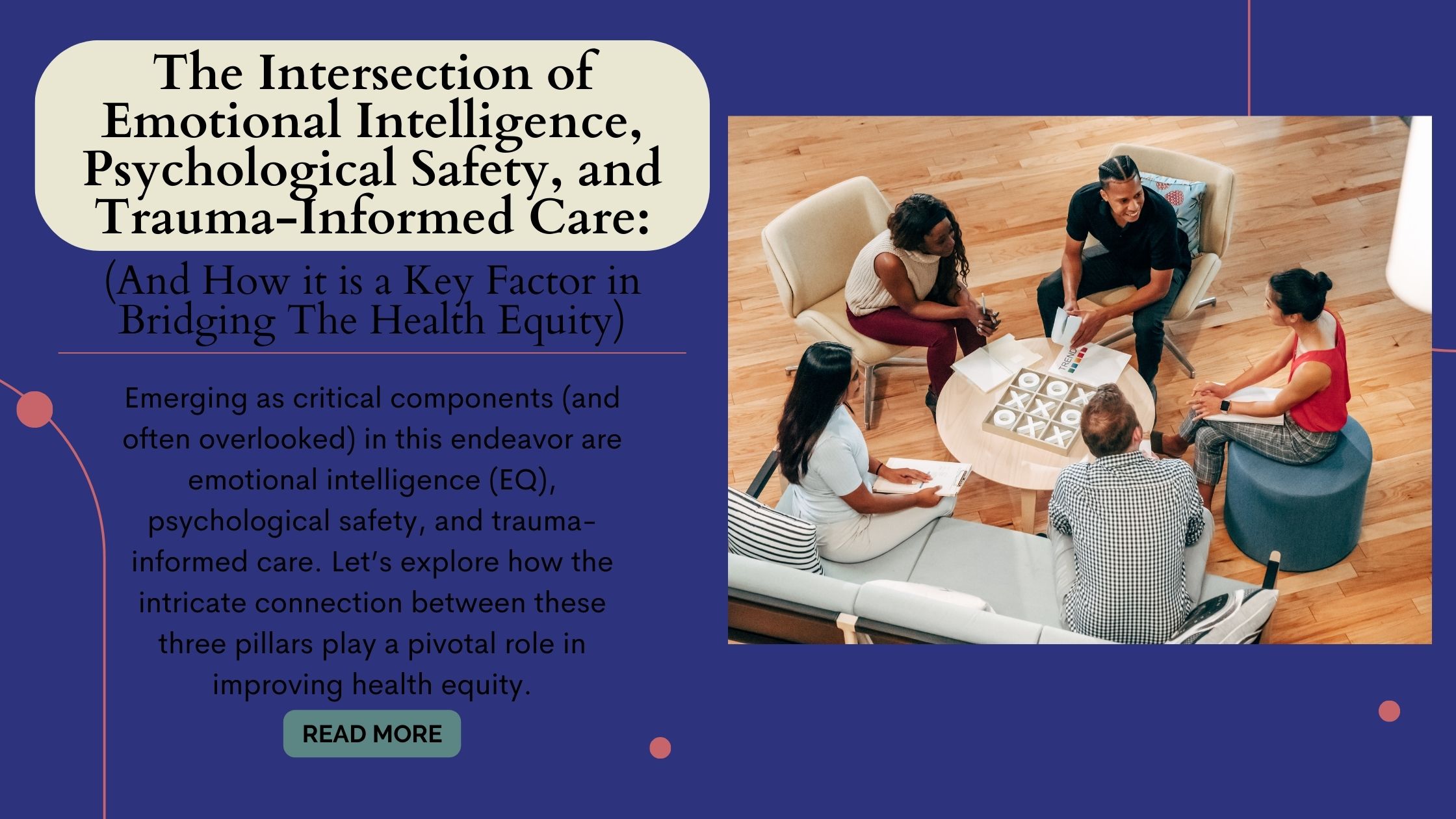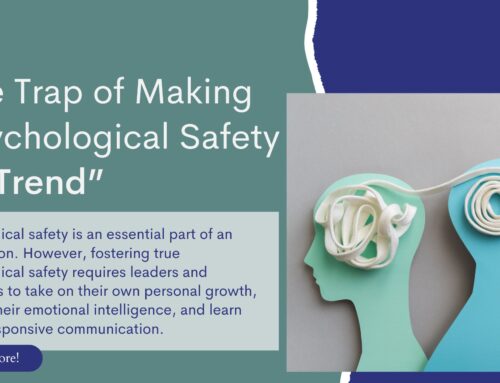
In today’s evolving healthcare landscape, achieving health equity stands as a paramount goal. The journey toward health equity involves addressing disparities in healthcare access, quality, and outcomes among diverse populations. Emerging as critical components (and often overlooked) in this endeavor are emotional intelligence (EQ), psychological safety, and trauma-informed care. Let’s explore how the intricate connection between these three pillars play a pivotal role in improving health equity.
Emotional Intelligence: The Heart of Healthcare
I remember sitting in the office with my father and his oncologist a few years ago. As I observed their interaction, I noticed the compassion with which this oncologist handled my dad. Although, I had questions as well, I didn’t want to occur like the overbearing physician daughter who didn’t respect the physician’s opinion. So, I sat quietly, listening. At the end of the visit, it was if the oncologist had sensed my concern. He turned to me without any rush and asked, “Now, do you have any questions?”
Emotional intelligence, often abbreviated as EQ, encompasses the capacity to recognize, understand, manage, and navigate one’s own emotions and those of others adeptly. In the realm of healthcare, EQ is more than just a desirable attribute—it’s a transformative skill. Healthcare providers with high EQ can establish genuine connections with their patients, fostering trust, enhancing communication, and ultimately yielding improved health outcomes.
Patients, especially those from marginalized or vulnerable backgrounds, greatly benefit from healthcare professionals with heightened emotional intelligence. They feel heard, understood, and valued, which can significantly impact their mental and emotional well-being. The empathy and compassion that come with EQ are particularly crucial when addressing patients who may have experienced discrimination or mistreatment within healthcare settings.
Psychological Safety: The Bedrock of Trust
Even as a physician, I still experience areas of medical mistrust. What I now know (that I didn’t used to know prior to my training) is that my areas of mistrust come from two things: my past traumas experienced inside of the healthcare system, and an experience of feeling unsafe to fully let my guard down when I’m not with the right healthcare provider for me. I have been gaslit, dismissed, and invalidated many times by healthcare providers. I have also been empowered, validated and listened to by some amazing physicians as well. The difference is startling, and those physicians and healthcare providers who have made it safe for me to fully express myself in visits have made the biggest difference in my care, and have remained a part of my healthcare team.
Psychological safety is the foundation upon which trust in healthcare environments is built. It encompasses the belief that one can voice concerns, share ideas, or express themselves without fear of retribution or negative consequences. Creating psychologically safe spaces is essential for both patients and healthcare professionals.
Patients need to feel safe discussing their health concerns, past traumas, and emotional states with their healthcare providers. Without psychological safety, patients may withhold critical information, impairing the accuracy of diagnoses and the efficacy of treatment plans. For marginalized or trauma-affected individuals, the fear of judgment or discrimination can be exceptionally daunting.
On the flip side, healthcare professionals also thrive in psychologically safe environments. They can openly communicate, collaborate, and learn from their mistakes, reducing burnout rates and fostering a culture of continual improvement.

Trauma-Informed Care: Healing through Understanding
Trauma-informed care is a compassionate approach that recognizes the pervasive impact of trauma on individuals’ physical and mental health. It centers around creating safe, welcoming, and empowering healthcare environments that account for the unique needs and experiences of trauma survivors. This approach acknowledges that trauma can lead to adverse health outcomes and seeks to prevent re-traumatization within healthcare settings.
The Intersection: Where EQ, Psychological Safety, and Trauma-Informed Care Converge
By themselves emotional intelligence, psychological safety, and trauma informed care can have an enormous positive impact on care. However, together, these three interconnected concepts have the potential to exponentially advance health equity:
A. Increasing Equity and Reducing Disparities in Access and Quality of Care
Healthcare systems with healthcare professionals who have high EQ actually create more psychological safety for their patients and patient communities. Doctors, nurses, and allied health professionals form more meaningful connections with patients from diverse backgrounds in these environments. This safety makes it feel safer for more marginalized and vulnerable populations to not only seek care, but also engage in open dialogues about their health. Furthermore, when healthcare professionals actively recognize the historical and systemic traumas faced by marginalized communities, and address those specific needs, they provide a higher quality of care to those populations.
Psychological safety cultivates an environment of respect and inclusivity, helping to thwart trauma-related health disparities. Trauma-informed care reduces the risk of re-traumatization, preventing further harm to individuals who have experienced trauma—an essential step toward health equity.
B. Elevating Healthcare Outcomes
Patients who feel emotionally supported and safe in healthcare settings are more likely to adhere to treatment plans, leading to better health outcomes. Healthcare professionals with strong EQ can engage patients in shared decision-making, resulting in personalized care plans that consider patients’ unique needs. Trauma-informed care equips healthcare providers to understand and mitigate the impact of trauma on health, delivering more effective and equitable care.
Conclusion
The relationship between emotional intelligence, psychological safety, and trauma-informed care is a dynamic force propelling us toward health equity in healthcare. By enhancing communication, trust, and understanding between patients and healthcare providers, these principles lay the groundwork for a healthcare system where everyone, regardless of their background or past experiences, can access equitable and compassionate care. As we continue our pursuit of health equity, integrating these principles into healthcare systems becomes increasingly critical to ensure that no one is left behind on their journey to good health and well-being.
Need a speaker? Learn more about Dr. Maiysha’s speaking, consulting, and training offerings. Bring the tools of trauma informed listening and speaking into your organization and create psychological safety for your leaders and staff. Increase productivity, employee satisfaction and retention. Contact us today and schedule a call with Dr. Maiysha to learn how we can improve your workplace culture. https://mindremappingacademy.com/corporate-programs
Bring Trauma Informed Listening and Speaking to your leaders and staff at large. Learn more Dr. Maiysha’s trauma informed communication course. Click here to learn more: https://mindremappingacademy.com/courses/ticc/






